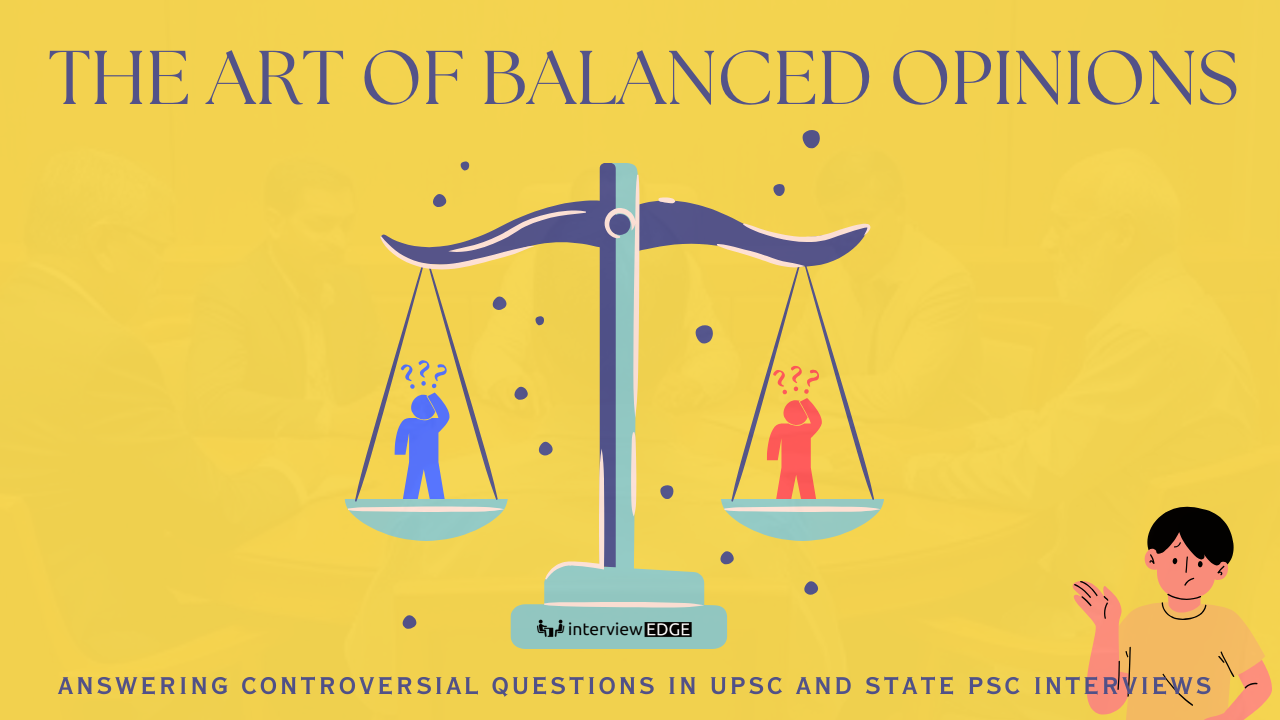
If you’ve ever been asked a tough question during an interview, you know that some questions can really make you sweat. And when it comes to the UPSC and State PSC interviews, the panel loves throwing in a few controversial questions that could catch you off guard. These questions often deal with politics, religion, or social issues—topics that people have strong opinions about. But here’s the thing: it’s not just about knowing the right answer. It’s about how you handle these tricky questions. So, how do you answer them without sounding defensive or overly opinionated? Let’s break it down.
Why Do Interviewers Ask Controversial Questions?
Here’s the real reason behind those tough questions:
- They want to test your composure. Can you stay calm when the topic gets heated?
- They’re looking for your thought process. Are you able to see an issue from different perspectives?
- They want to judge your judgment. Do your answers show balance, fairness, and practicality?
- They care about your respect for diversity. Can you handle a variety of views without getting defensive?
So, you see, these questions aren’t just about what you know—they’re about who you are as a person.
How to Handle Controversial Questions Like a Pro
-
Stay Calm and Collected
Let’s be honest—sometimes, controversial questions can make you feel uncomfortable. But here’s the key: stay calm. If you panic or react emotionally, it could undermine your answer. Just take a moment to breathe, gather your thoughts, and respond thoughtfully.
Example:
Question: “What are your views on the privatization of public sector enterprises?”
Response: “Privatization can bring efficiency and innovation, but we also have to be mindful of its social implications. We need to ensure that essential services and employment don’t get compromised.”
-
Avoid Extreme Views
I get it—sometimes, it’s tempting to take a strong stance, but extreme opinions can make you seem inflexible. Instead, aim to acknowledge both sides of the argument and show that you’ve thought about it from multiple angles.
Example:
Question: “Should India abolish capital punishment?”
Response: “It’s a tough one. While capital punishment might deter some crimes, there are serious ethical concerns, especially with the risk of irreversible mistakes. A middle ground, perhaps reforming the judicial system, could be a way forward.” (You should also incorporate opinions of famous personalities regarding the topic).
-
Ground Your Response in Facts
No one likes an answer that sounds too opinionated without backing it up. When you base your response on facts—be it data, reports, or historical examples—you come across as more credible. Plus, it shows that you’re not just talking from the top of your head.
Example:
Question: “Is the reservation system still relevant in modern India?”
Response: “The reservation system has played a key role in uplifting marginalized communities. Statistics show improved educational access for those who benefit from it, but there’s always room for fine-tuning to make sure the benefits reach the people who need them the most.” (You can include data from Justice Rohini panel on OBC sub-categorization)
-
Respect Opposing Opinions
It’s important to understand that there’s rarely a black-and-white answer to controversial topics. When you respect opposing opinions, it reflects maturity and open-mindedness. Even if you don’t agree with a viewpoint, acknowledging it shows that you can be diplomatic.
Example:
Question: “What’s your take on the implementation of the Uniform Civil Code?”
Response: “The Uniform Civil Code is a great idea in theory—it aims to provide equality across all communities. But implementation must be sensitive and inclusive, ensuring that all communities are on board and their concerns addressed.”
-
Offer Balanced Solutions
When it comes to controversial issues, it’s always better to end with a balanced solution that shows you’re a problem solver. Nobody expects you to have all the answers, but offering a thoughtful approach shows that you’re practical and willing to find common ground.
Example:
Question: “How should the government handle farmer protests?”
Response: “The key is dialogue. The government needs to engage with farmers in a meaningful way, addressing their concerns. A transparent, inclusive process could lead to a resolution that benefits both sides.”
Mistakes to Avoid
- Being Defensive: If you’re asked something you disagree with, don’t get defensive. Just present your perspective calmly.
- Using Emotional Language: Stick to the facts and avoid sounding overly emotional.
- Dodging the Question: It’s tempting to avoid tough questions, but trying to sidestep them can hurt your credibility.
- Overgeneralizing: Avoid sweeping statements like “always” or “never.” (Extremes will get you in trouble just like in Prelims 🙁 ).
Practice Makes Perfect
The more you practice, the more natural you’ll sound during your interview. Try out mock interviews with a focus on controversial topics. Keep in mind: it’s not just about the content, but how you deliver it. Think of it as a conversation rather than a lecture.
Practice Question: “Should social media platforms be regulated by the government?”
Your Approach:
- Acknowledge the importance of free speech.
- Discuss the risks, like misinformation or cyberbullying.
- End with a practical, balanced solution like collaborative regulation with industry experts.
Final Thoughts
Handling controversial questions in the interview is an essential skill, and it’s not about having the perfect answer. The panel isn’t looking for someone who can perfectly predict every outcome—they want to see if you can handle tough topics with diplomacy, respect, and practical solutions.
So, next time you face a controversial question, remember: Stay calm, acknowledge multiple viewpoints, and be as balanced as you can. With practice, you’ll find that answering these questions becomes second nature.
Let us know if there’s any other topic you’d like us to cover in an article. We’re here to support your preparation journey. Best of luck with your interviews.
